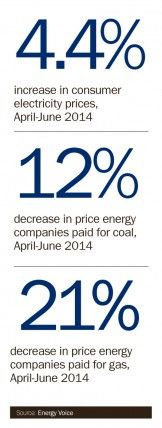Energy has always been the most political of industrial sectors, stretching back to the days when OPEC (Organisation of Petroleum Exporting Countries) imposed an oil embargo in the 1970s that quadrupled the price of oil and had ramifications around the world.
Dale Vince, founder of green energy retailer Ecotricity, says party politics are still having a fundamental impact on the energy market. “The Tories are clearly the party of fossil and nuclear fuel. Having moved to shut down the solar and wind industries through a mixture of rapid and repeated financial cuts, and adverse movement in planning regulations. In contrast, they’ve signed up to 35 years of nuclear support at twice the price of onshore wind – and cut planning regulations for fracking and offered the most generous tax regime in the world,” he says.
“On the other hand, the Lib Dems and Labour clearly support renewable energy, and are perhaps less clear on nuclear and fracking. But the real hand grenade in the room came from Ed Milliband when he promised to freeze energy prices for 20 months if elected. It caused the Tories to make a hasty response which centred on blaming ‘green crap’ for the rise in bills and promising a £12 per household reduction in energy bills paid for by central government. A more naked pre-election bribe perhaps never existed.
“The decisions made in the next year or two are fundamental to our future economy and cost of living. Politics is the primary driver of those decisions now, for good or bad.”
Politics and energy policy are totally intertwined because energy is the commodity on which the rest of the economy works, says Peter Atherton, utilities analyst at Liberum. “One of the ideas behind privatisation in the 1980s was to take the politics out of the sector,” he says.
ENERGY TRILEMMA
But given the conflicting demands of the “energy trilemma” – the need to keep the lights on, keep energy bills affordable and decarbonise the energy sector – that was always a forlorn hope. “Anything to do with energy and climate change is intertwined with politics – and that is just life,” says Ian Temperton, head of advisory at Climate Change Capital.
The issue of affordability is driving the debate at the moment and this has led to “a clear step back in ambition for renewable energy and low carbon projects”, says Richard Slark, director of renewables at energy consultancy Poyry.
The issue of affordability is driving the debate at the moment and this has led to a clear step back in ambition on renewable energy and carbon targets
A clear bias in the Conservative Party against renewable energy has emerged over the course of this government, evidenced by the appointment of climate change sceptic Owen Paterson, who has since moved on as Environment Secretary, and the intervention by Eric Pickles, the Communities and Local Government Minister, in 50 renewable energy projects that critics say local planners should have been allowed to determine.
The focus on affordability is inevitable and efforts to cut the cost of renewable energy are to be welcomed, Mr Slark says, “but it becomes counter-productive when it leads to sudden changes in policy that are not signalled in advance. That unsettles investors. Without clarity on how policy is going to evolve, investments get put off or become more expensive.”
Juliet Davenport, founder and chief executive of Good Energy and member of the British Wind partnership, agrees that regulatory stability is essential for long-term planning. “If long-term investment and economic growth in renewables is to thrive, the market must have stability. Political volatility and policy uncertainty of the kind we’re currently seeing serves only to put all this in jeopardy,” she says.
EVEN-HANDED VOLATILITY
It is not just renewables that are subject to this volatility. In 2011, the North Sea oil and gas sector was stunned by a £2-billion windfall tax; however, tax breaks for the industry followed a year later, along with a new “bareboat chartering” tax and an exploration tax break in 2014.
But some experts say the UK government does not deserve all the criticism it has received. “It is very easy to criticise the government, but I commend it for the way it has acted,” says Antony Skinner, an energy lawyer at Ashurst. “It has implemented policies slightly more slowly and it created a bit more uncertainty than many would have liked, but on the whole, the decisions have been correct.”
Even though the government has cut support payments for renewable energy projects, it has been careful not to apply cuts retrospectively to existing projects, as countries such as Spain and Italy have done.
In introducing the Electricity Market Reform, its showcase energy policy, “it has stuck reasonably well to the timetable and has given plenty of notice of changes to renewables support”, says Climate Change Capital’s Mr Temperton. “You can’t expect to have an open-ended subsidy regime, especially in the current age of austerity. The government had to get to grips with costs, but it made a point of not affecting existing investments.”
Investment is also affected by events outside of the government’s control, such as the Scottish independence referendum, which put a brake on the development of many projects.
“Independence would have been cataclysmic for a number of years,” says Peter Dickson, technical director at Glenmont Partners. “There would have been effectively a moratorium on investment. Fiscal policy in Scotland was up in the air and we were very concerned about what the cost of lending would have been. Currency, fiscal and price issues are much more certain now.”
Ultimately, says Mr Slark, the influence of politics on the energy sector is nothing new. “Energy is so critical to everyone’s daily lives that it would be naive to think that politics would not play a major role in it.”

